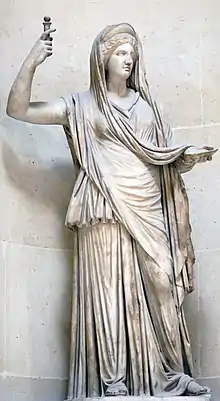Hero
English
Etymology
From Ancient Greek Ἡρώ (Hērṓ).
Proper noun
Hero
- (Greek mythology) Any of a number of legendary men and women, including the priestess loved by Leander.
- (rare) A female given name from Ancient Greek of English-speakers.
- 1598–1599 (first performance), William Shakespeare, “Much Adoe about Nothing”, in Mr. William Shakespeares Comedies, Histories, & Tragedies […] (First Folio), London: […] Isaac Iaggard, and Ed[ward] Blount, published 1623, OCLC 606515358, [Act I, (please specify the scene number in lowercase Roman numerals)]:,Scene 1:
- You hear, Count Claudio: I can be secret as a dumb man; I would have you think so; but on my allegiance mark you this, on my allegiance: he is in love. With who? now that is your Grace's part. Mark how short his answer is: with Hero, Leonato's short daughter.
-
Esperanto

statuo de Hero
Etymology
From Ancient Greek Ἥρᾱ (Hḗrā).
Pronunciation
- IPA(key): [ˈhero]
- Rhymes: -ero
- Hyphenation: He‧ro
This article is issued from Wiktionary. The text is licensed under Creative Commons - Attribution - Sharealike. Additional terms may apply for the media files.